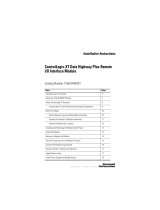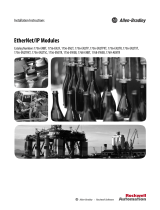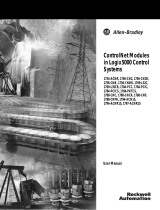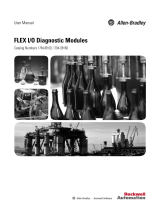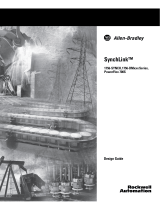
12 Rockwell Automation Publication 1756-UM058G-EN-P - November 2012
Preface
Additional Resources
These documents contain additional information concerning related products
from Rockwell Automation.
You can view or download publications at
http://www.rockwellautomation.com/literature/
. To order paper copies of
technical documentation, contact your local Allen-Bradley distributor or
Rockwell Automation sales representative.
Resource Description
1756 ControlLogix I/O Modules Specifications
Technical Data, publication 1756-TD002
Provides specifications for ControlLogix I/O modules.
ControlLogix High-speed Counter Module User Manual,
publication 1756-UM007
Describes how to install, configure, and troubleshoot the
1756-HSC counter module.
ControlLogix Low-speed Counter Module User Manual,
publication 1756-UM536
Describes how to install, configure, and troubleshoot the
1756-LSC8XIB8I counter module.
ControlLogix Peer I/O Control Application Technique,
publication 1756-AT016
Describes typical peer control applications and provides
details about how to configure I/O modules for peer
control operation.
Position-based Output Control with the MAOC Instruction,
publication 1756-AT017
Describes typical applications for using scheduled output
modules with the Motion Axis Output Cam (MAOC)
instruction.
Integrated Architecture and CIP Sync Configuration
Application Technique, publication IA-AT003
Describes how to configure CIP Sync with Integrated
Architecture™ products and applications.
ControlLogix Chassis and Power Supplies Installation
Instructions, publication 1756-IN005
Describes how to install and troubleshoot standard and
ControlLogix-XT versions of the 1756 chassis and power
supplies, including redundant power supplies.
ControlLogix Analog I/O Modules User Manual,
publication 1756-UM009
Describes how to install, configure, and troubleshoot
ControlLogix analog I/O modules.
ControlLogix Data Highway Plus-Remote I/O
Communication Interface Module User Manual,
publication 1756-UM514
Describes how to configure and operate the ControlLogix
DH+™ / Remote I/O module.
ControlLogix-XT Data Highway Plus-Remote I/O
Communication Interface Module Installation
Instructions, publication 1756-IN638
Describes how to install, configure, and troubleshoot the
ControlLogix-XT Data Highway Plus™-Remote I/O
Communication Interface module.
ControlLogix System User Manual,
publication 1756 UM001
Describes how to install, configure, program, and operate
a ControlLogix system.
Industrial Automation Wiring and Grounding Guidelines,
publication 1770-4.1
Provides general guidelines for installing a Rockwell
Automation industrial system.
Product Certifications website, http://ab.com
Provides declarations of conformity, certificates, and other
certification details.




















